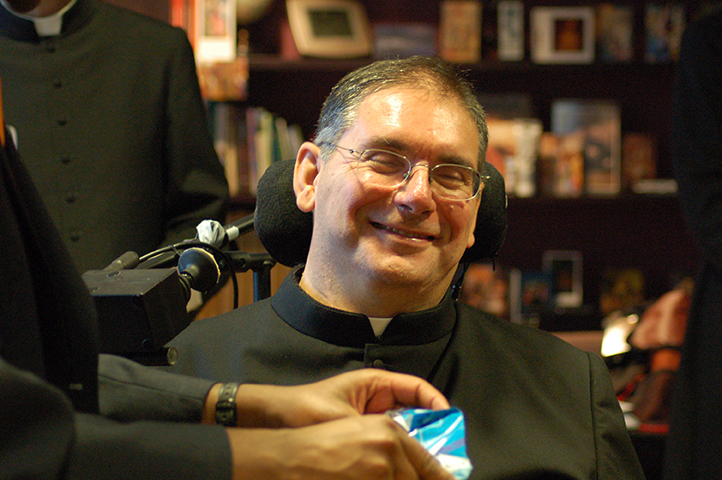The priest Luis de Moya passed away on Monday, November 9, in Pamplona. "Don Luis", as he was familiarly known, had suffered a serious accident in 1991 that left him a quadriplegic. With his physical limitations he multiplied his pastoral work and, above all, he brought to life that response to mail "it is worth the effort until the end".
Many people have felt as their own the departure to heaven of the priest of Opus Dei, Luis de Moyaknown all over the world for the testimony he collected in his book On the flyin which he recounts his experiences and reflections following his accident: at least six editions of this book have been published and it has been translated into several languages. Among those who bid him farewell, with sorrow but with the certainty that he is in heaven, stand out those who have lived with him, especially since 1991 and in his last moments: his family, the rector and the residents of the Colegio Mayor Aralar, where he lived, friends... all remember Don Luis. his joy, his hard-working patience and his example he gave, even while unconscious in his last moments.
In fact, when he was admitted to the Clínica Universitaria de Navarra, still unconscious, his example touched many people, especially doctors and nurses. One of the nurses who attended him in his last moments described those days as "a very special time". "an oasis in the midst of what I have suffered this year because of the pandemic.".
Joy in small things
José María Mora, is one of the students who was part of the team of 6 people who, together with, took care of Don Luis in these last years. Revista Palabra has been able to talk to this resident of Aralar who says goodbye these days to Don Luis and emphasizes his way of enjoying the little things. "An enjoyer of life." so describes it. What most admired those of us who were with him was that, despite his limitations, he enjoyed himself with small joys, for example, sunbathing when Real Madrid won, or eating the things he liked, such as mushrooms, salmon, etc.," he said.".
This Costa Rican recalls a little anecdote related to this hobby: "He was very fond of cooking and watching cooking shows. One day, I was feeding him, something very normal, a soup or some lentils, and the TV chef showed a delicious salmon on the screen and his reaction was a slight startle, saying, 'Wow, it's so good!
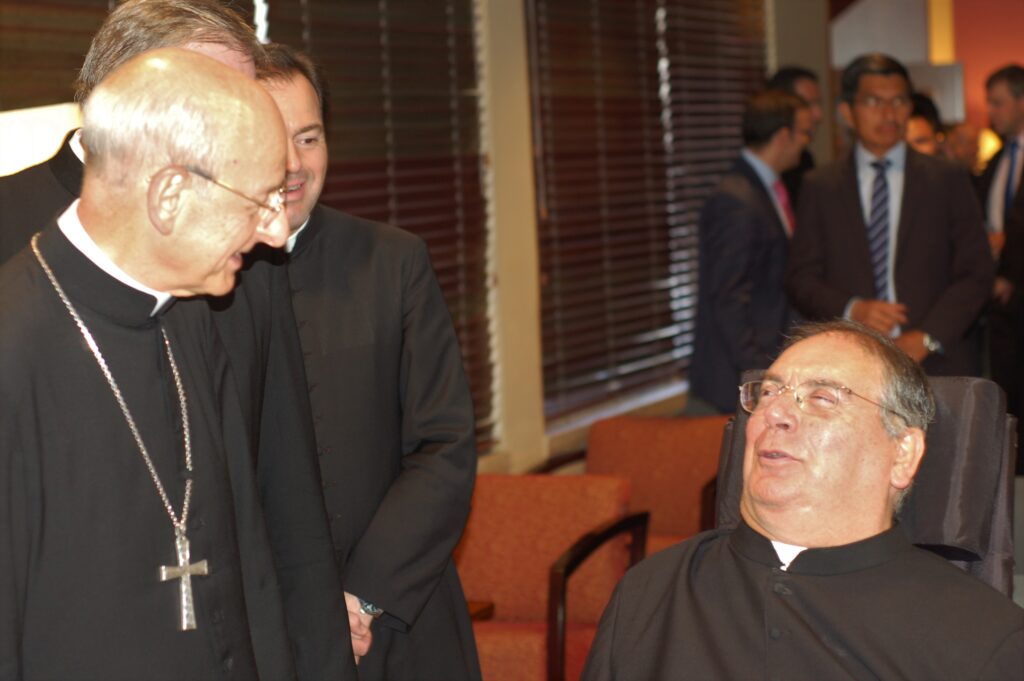
Passionate about soccer, Luis de Moya was a staunch madridista, so he enjoyed watching Real Madrid, but not only his team, sometimes he watched games from other seasons or other teams to see plays and goals even if it was "insignificant" or even contrary to his soccer colors.
A caring family
After the accident that left him practically immobile, the question arose as to whether he could be cared for at home. Blessed Álvaro del PortilloThe answer was affirmative, and after consulting with the doctors, the prelate of Opus Dei at that time, who, once the answer was affirmative, decided that Don Luis would continue to live and be cared for in his home, even if renovations and refurbishments had to be carried out. Mariano Amores, Luis, and remembers how he got an adapted van with which he was able to go to see his mother, who was already very ill at the time: "A tiring trip, he had to go to Madrid by plane and from there, with the new van, to Granada, with many stops because he had to change his posture frequently."to avoid sores.
The care of Don Luis was not easy and it was necessary to learn how to do it; something in which the priest collaborated with a lot of patience, since the group of caregivers, except Juan Carlos, his nurse, changed from time to time, since the passage through the Colegio Mayor is temporary. Those who have cared for him during this time remember the priest's small gestures, such as how he would make someone who was more serious smile with a comment or a joke, or how he would make it easier to learn the protocols.
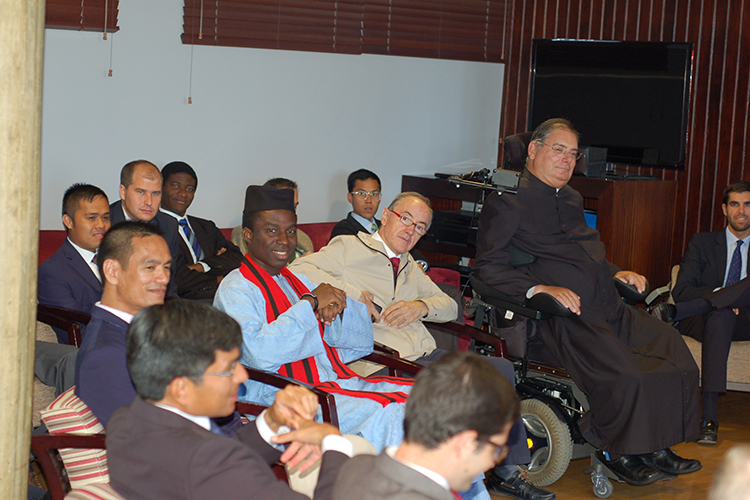
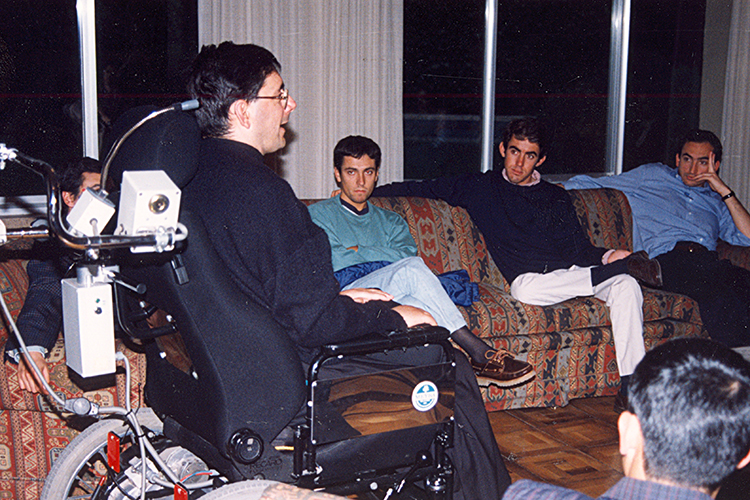
On one occasion, one of these students was somewhat reluctant because of his inexperience and Don Luis asked him to be in charge of preparing him that day, even if it meant arriving later to morning prayer, or having to start several times.... "Impressed." continues Jose Maria, "Their surrender and obedience, because in the end it is a surrender of intimacy, when they have to do everything for you: dress you, clean you...".
For the priest, it was an effort and for those who cared for him, a test of maturity: "I think" continues Jose Maria. "that part of the vocation God was asking of him in his situation was to help polish the character of those of us who cared for him.". In fact, Don Luis was a man of few words, straightforward and direct "when he had to correct or say something, he would say it very clearly and without anger, if you did something wrong you knew it, because he would point it out, without being sour"
Priest on wheels
Every day until October 27, when he was hospitalized at the University Clinic of Navarra, he concelebrated Holy Mass with another priest. "He didn't like to flaunt piety." highlights Michelangelo MarcoHe was the director of the Colegio Mayor Aralar, something that his fellow priests and the residents of the Colegio Mayor also emphasize. He prepared himself beforehand in the oratory with a long time of prayer.he "deep and long silence he made in the memento. It could be seen that he was really commending the people he had in mind, and there were many of them.".
Your pastoral work had a privileged channel in the Fluvium through which he formed and provided faith resources to thousands of people. He received hundreds of e-mails asking him to pray for intentions, or telling him about issues concerning his life..... And he would answer them personally thanks to an electronic device. At times he had to ask for help in writing because of a device failure or because, "in the last year due to a corneal ulcer in the left eye he was losing the sight of that eye".
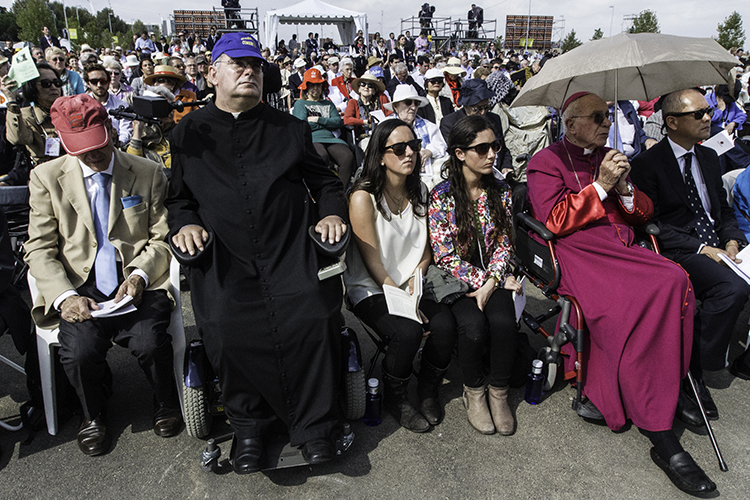
The Rosary was her powerful weapon; she prayed all four parts every day, and often looked at the Virgin of Guadalupe from her room.
Squeeze to the end
Jose Maria Mora recalls that one of those emails they had to help him answer was from a young man who asked for prayers because he was about to take an important step in his life. Don Luis replied "with a lot of respect and encouragement and told him that it was worth squeezing every last drop out of every moment of his life. I remember that email now and I see that it is just what he has done until his death.".
Mariano Amores recalls something similar when he points out "If I could summarize his life in a few words, I would choose his response to an interview he gave in which the journalist reminded him of the phrase that appears in the book Sobre la marcha - I feel like a millionaire who has lost only 1,000 pesetas. Don Luis answered something like yes, but let it be clear, those 1,000 pesetas must be forgotten. That was his life: he forgot about what he had lost, about those 1,000 pesetas, and lived on"..


